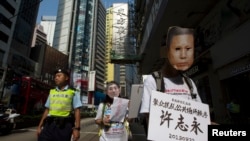BEIJING —
An influential Chinese Communist Party journal denounced on Wednesday Western calls for political reform saying such pressure was aimed at getting rid of the Communist Party and its leaders.
The unusually strong attack on the Western “democracy trap,” published in the journal Qiushi, comes during a sustained government campaign against political dissent.
“Western countries attack us for having a constitution but no constitutional government, saying the Communist Party as a one-party system is illegitimate, and that the Communist Party is above the law,” said Qiushi, which means “seeking truth.”
“This is so they can pressure us to put in place the 'political reforms' they so earnestly hope for, the real goal of which is to eliminate Communist Party leaders and change our socialist system.”
The attack echoed a Party document leaked to media in August, known as Document No. 9, which criticized Western constitutional democracy as a threat to the Party's grip on power.
Journalists, lawyers and rights activists have been detained or arrested in recent months in a widening crackdown on dissent.
Authorities have also begun a campaign against “rumor-spreading” on the Twitter-like Sina Weibo microblog service, long a platform for criticism of the authorities.
Qiushi denounced what it called the Western brand of democracy and asked why the United States was so keen to export it to the world.
“In reality, competitive elections mean playing by the rules of Western democracy, and exported to non-western countries, often result in social divisions, ethnic antagonism, political strife and endless political instability,” it said.
“This is the inherent mechanism of western democracy, and should be called the 'democracy trap.'”
Western values, such as constitutionalism and democracy, would only foster political unrest, greater corruption, and ethnic strife in China, it said.
“They say that only if China accepts these so-called 'universal values' can it have a future,” Qiushi said. “This strong secular universalism has always been the way of Western foreign expansion, and provides the ideological basis to conquer the world.”
Advocates of Westernization, it said, were plotting to “mess with the minds of the people” and split up China.
“This most powerful hand is the one we must be wary of the most.”
Chinese liberals and intellectuals had hoped the new government that took over this year, under President Xi Jinping, would be more tolerant of calls for reform but authorities have indicated they will not put up with any challenge to their rule.
The unusually strong attack on the Western “democracy trap,” published in the journal Qiushi, comes during a sustained government campaign against political dissent.
“Western countries attack us for having a constitution but no constitutional government, saying the Communist Party as a one-party system is illegitimate, and that the Communist Party is above the law,” said Qiushi, which means “seeking truth.”
“This is so they can pressure us to put in place the 'political reforms' they so earnestly hope for, the real goal of which is to eliminate Communist Party leaders and change our socialist system.”
The attack echoed a Party document leaked to media in August, known as Document No. 9, which criticized Western constitutional democracy as a threat to the Party's grip on power.
Journalists, lawyers and rights activists have been detained or arrested in recent months in a widening crackdown on dissent.
Authorities have also begun a campaign against “rumor-spreading” on the Twitter-like Sina Weibo microblog service, long a platform for criticism of the authorities.
Qiushi denounced what it called the Western brand of democracy and asked why the United States was so keen to export it to the world.
“In reality, competitive elections mean playing by the rules of Western democracy, and exported to non-western countries, often result in social divisions, ethnic antagonism, political strife and endless political instability,” it said.
“This is the inherent mechanism of western democracy, and should be called the 'democracy trap.'”
Western values, such as constitutionalism and democracy, would only foster political unrest, greater corruption, and ethnic strife in China, it said.
“They say that only if China accepts these so-called 'universal values' can it have a future,” Qiushi said. “This strong secular universalism has always been the way of Western foreign expansion, and provides the ideological basis to conquer the world.”
Advocates of Westernization, it said, were plotting to “mess with the minds of the people” and split up China.
“This most powerful hand is the one we must be wary of the most.”
Chinese liberals and intellectuals had hoped the new government that took over this year, under President Xi Jinping, would be more tolerant of calls for reform but authorities have indicated they will not put up with any challenge to their rule.





